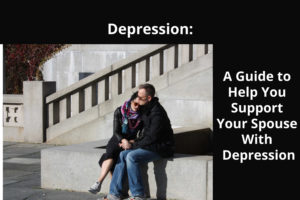A Guide to Help You Support Your Spouse With Depression

Q & A
What is the best way to support your spouse when they are going through a period of depression?
Here are a few major statistics on depression. It is estimated that in the United States, 16.2 million people (6.7%) have at least one massive depression episode in a given year. Depression is a common illness worldwide, with more than 300 million people affected. It is different from usual mood fluctuations and short-lived emotional responses to challenges in everyday life. Especially when long-lasting and with moderate or severe intensity, depression may become a serious health condition. It can cause the affected person to suffer greatly and function poorly at work, at school and in the family. At its worst, depression can lead to suicide. Close to 800,000 people die due to suicide every year. Suicide is the second leading cause of death in 15-29-year-olds.
Depression results from a complex interaction of social, psychological and biological factors. People who have gone through adverse life events (unemployment, bereavement, psychological trauma) are more likely to develop depression. Depression can, in turn, lead to more stress and dysfunction and worsen the affected person’s life situation and depression itself.
There are interrelationships between depression and physical health. For example, cardiovascular disease can lead to depression and vice versa.
Misunderstandings About Depression
When it is not easy to understand something, a flippant opinion often slips out of us. Understand that the person with depression doesn’t want to be that way. They would gladly not be depressed if they could. Here are some things people say to the depressed:
- I’ve heard people say, “When you get depression, just get over it!” Believe me, it is not that simple. That’s like saying, “If the arteries of your heart are clogged, just get over it!”
- Saying, “You are a Christian so you shouldn’t be depressed” only makes it worse.
- Telling someone they shouldn’t be depressed because there is so much to not be depressed about doesn’t help either.
Our Experience With Depression
(Mitch here) I’ve had one or two episodes of depression per year for most of my adult life. I believe much of my depression is linked to the lack of sunlight. In Northern Indiana we don’t have much sun in the winter, so taking vitamin D in the winter months is pretty much recommended for everyone. The only time I noticed I didn’t have depression at all was the three-and-a-half years we traveled full time in the RV. I believe there were several contributing factors to this run of no depression. First, we were in the north in the summer and the south in the winter. Therefore, we chased the sun, so to speak, and we always had lots of sunshine. Secondly, I don’t think I had much, if any, stress at this time.
What’s depression like for me? It can range from wanting to lay around and being listless, to not wanting to be alive. I’ve never been suicidal, but when my deep depression sets in, I don’t want to be alive. I just feel the world would be better off without me. I know that’s not rational, but that’s what I feel like when I’m depressed. This can be extremely difficult for me as a Christian because we are to be alive in Christ and thankful. When depression sets in, things change in our minds and it’s hard to see things the way we should. I chose not to get medication because the depression usually only lasts a week or two. Also, as a counselor, having depression has motivated me to help others and to have more empathy for them.
Some things I learned
There was a time when I was considering leaving my work. I talked with a counselor and we both agreed that I was depressed. He gave me some good advice. He said, “You are making a big decision while you are depressed. I think you need to be free of depression to make the best decision here.” I agreed. I went to a doctor to get some medication and felt normal in a month or so. I still left my work, and for me, it was the right decision – but I didn’t make that decision under the cloud of depression. Kim and I both know we made the right choice for us, and I know we made it with good mental health and a good outlook.
If a friend lets you know they are going through depression:
- Check back with them and see how they are doing
-
Do something with/for them to make them feel valued
- Do something to make them laugh
- Take them to do something for someone else. This builds self-worth.
- Whatever you do, get back with them every day or two and see how they are doing. If you don’t show them that you care by getting with them, it only makes them feel less valued… and that can fuel the depression. This is incredibly important. If a person gets with ten friends and only one or two care enough to get back with them, it can make you feel like you are of no value and what’s the use of going on.
Kim’s depression
When Kim was about thirty-five, a doctor told her that he thought she would benefit from depression medication. I was with her and explained that she couldn’t be depressed because she lives with me (humor here)! He knew me and told me maybe he should double her dosage! Kim’s depression manifests itself in that she feels sad, cries easily, and her mind can get foggy. This makes decision making difficult and things seem overwhelming for her. It makes her wants to withdraw and not be around people and she is also less confident of herself. She’s never considered suicide or felt like she didn’t want to be alive. Now, over 20 years later, Kim is still on a low dose of medication. She tried to go off of it a few times but didn’t like the way she felt.
Supporting A Spouse With Depression
(Kim’s input)
- Be positive. Your spouse will probably see the glass as half empty so remind them of the other side of the equation.
- Remember that counseling, medications, and holistic medicines are things that may help. They may not want your help, but encourage them anyway. They know you are doing this because you love them.
- Help them carry the load. If something seems overwhelming to them, help them out if you can. Making decisions is not one of my strengths to begin with, but when I am depressed it can become even harder. Mitch helps lighten my load by making more of the decisions. Sometimes I will ask him to make the decision or sometimes he will offer and ask me if I want him to make the decision. If your spouse is really depressed, you may need to intercede and offer to make an appointment for them with a doctor or a counselor.
- Encourage them in self-care. Make sure that the two of you are going to bed early enough so they are getting the necessary amount of sleep. Ask them to go on a walk with you. Make healthy meals.
- Consider purchasing a therapy light, particularly if you are affected by seasonal affective disorder. A friend of ours who had a daughter living in Alaska told us about a light that simulates the sunrise, allowing you to wake up gradually in the morning rather than to the blare of an alarm clock. I really appreciate being able to wake up naturally in the winter when it’s still dark out at the time that I need to get up. Another advantage to the light I use is that it is small and portable so I can easily take it from room to room if I want to use it in another area of the house or so I can take it along with me when I travel.
- Extend extra grace. Remember, as we mentioned earlier, your spouse doesn’t want to feel this way.
Natural Ways To Treat Depression
- Stay in God’s Word. Encouraging words from our creator can only help the situation. The Bible has a lot to say about depression and also how to think. Read the book, “Telling Yourself the Truth” as this is the best book on self-talk I’ve found. I’ve put a link to it at the bottom of the article.
-
Get outside your comfort zone and serve others, expecting nothing in return. When we love on others, God transforms our hearts. Read 1 John Chapter 3:18-24. I like the Message paraphrase on this:
My dear children, let’s not just talk about love; let’s practice real love. This is the only way we’ll know we’re living truly, living in God’s reality. It’s also the way to shut down debilitating self-criticism, even when there is something to it. For God is greater than our worried hearts and knows more about us than we do ourselves. And friends, once that’s taken care of and we’re no longer accusing or condemning ourselves, we’re bold and free before God! We’re able to stretch our hands out and receive what we asked for because we’re doing what he said, doing what pleases him. Again, this is God’s command: to believe in his personally named Son, Jesus Christ. He told us to love each other, in line with the original command. As we keep his commands, we live deeply and surely in him, and he lives in us. And this is how we experience his deep and abiding presence in us: by the Spirit he gave us.
- Say “no” once in a while. Sometimes we take on more than we were meant to handle. It isn’t a weakness to say no. When we are over-committed, it isn’t a strength.
- Exercise DAILY. Not every once in a while. Exercise releases endorphins, which are chemicals that make you feel good.
- Eat little to no added sugar (cakes, candy, pop, sweets, juice, etc). Sugar causes depression so don’t turn to it for your temporary high. Turn to exercise instead!
- If you have a friend who often posts negative things on social media, unfollow them.
- When a negative comment is said to you personally, don’t take it to heart. Don’t dwell on it – release it. Often I consider the source and that helps.
- Don’t sit in a quiet house. Turn on some music, watch a stand-up comedian (Ryan Hamilton, John Crist, Ken Davis, Mark Lowrey and Tim Hawkins are just a few of the clean and funny comedians), or watch an uplifting TV program (not the news).
- Don’t hold a grudge – release it! Refusing to forgive is like you taking poison and then expecting the other person to die.
- Let go of jealousy. Celebrate others’ success and good fortunes with them.
- Learn to be content with what you have. If you are able to, visit or serve in a developing country. You will see just how much you have and realize just how fortunate you are. Thankfulness makes what you have enough.
- If you need to vent about something, limit it to just two people so as not to spread dissension among people.
- Shut out the world and let God’s word pour into you.
- Find a hobby – one that you REALLY enjoy!
- Choose to see the good in others. Everyone has both good and bad qualities so try to focus on their good qualities.
- Don’t play the victim. Turn your life around. You shouldn’t let your past decide what kind of person you are going to be. Don’t let it be a crutch to get through life. Don’t let what has happened to you in the past become your identity.
- Dance. Turn on the music and let loose.
- When you are in a bad mood, force yourself to smile. You will feel like you are truly smiling after a few seconds.
- Support your spouse. When your spouse’s needs are met, they are usually happy to meet your needs as well. Get to the point where it makes you happier to see your spouse happy than for you to be happy.
- Don’t turn your spouse down when it comes to sex. Give it a few minutes, see where it goes. Sex releases endorphins and your marriage will become stronger as well. Use the Nike slogan – if one of you wants to, Just Do It. There is usually a level of satisfaction once you get started, so the issue is just getting started. Just Do It! (Thank you, Nike!)
-
Remember this:
- Small minds talk about people
- Average minds talk about things
- Great minds talk about ideas
Here’s a link to Telling Yourself the Truth
Here’s a link to Mitch’s Sun Light
Here’s a link to Kim’s Small Sun Light




